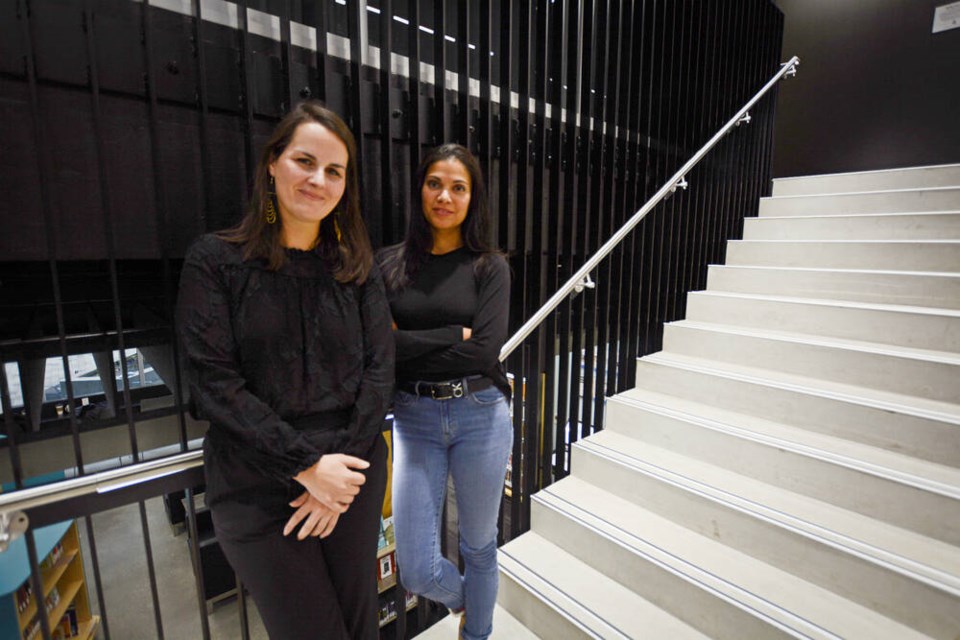Is a criminal justice system that only punishes offenders one that best serves its citizens?
For a quarter century, North Shore Restorative Justice Society has been diverting people facing charges away from court hearings, and toward community-based outcomes that don’t conclude with criminal records. On Nov. 18, the organization is holding its annual fundraising gala at North Vancouver’s The Polygon Gallery, in-person for the first time in three years.
The idea that when someone causes harm, and is punished for it, equals justice served isn’t reflected in real-world situations, explains Sioned Dyer, executive director for NSRJS.
“Research tells us that it actually doesn’t yield the outcome that we think, in terms of the offender decides in that moment to become a better person,” she said. “In fact, often it’s the opposite, especially if they serve time and they have a criminal record.”
So, instead of framing crimes as offenders acting against the Crown, the restorative justice approach gives a central focus to victims, while getting accountability from the person who caused harm, Dyer said. And NSRJS can facilitate the same kind of legal restitution you’d see at provincial court.
“We facilitate over $30,000 worth of financial restitution annually from offenders to victims, letters of apology, community service – things like that," Dyer continued, adding that her society’s work happens on a much shorter timeline than the court, and at a much-reduced cost to the taxpayer.
And, if the offender successfully completes the process, they don’t get a criminal record.
Foundations of restorative justice on the North Shore
While Dyer recognizes the Indigenous roots of restorative justice work – whereby First Nations have been carrying out community-based responses to conflict since time out of mind – the North Shore society got its start in 1997, when North Van City mayor Jack Loucks and councillors at the time were seeking alternatives for handling youth getting involved with police.
The organization began with a very small group of staff, who would get cases referred to them by local RCMP. In 2010, NSRJS got charitable status, and has continued to grow in recent years, as awareness of factors like systemic racism has become more widespread, along with the appetite to look for different responses to bias in the criminal justice system.
Now, the society has around 12 staff supporting two major initiatives: the aforementioned court diversion program, as well as their school-based program.
Dyer said she often thinks of Judge Joanne Challenger, a provincial court judge in North Vancouver who also runs the First Nations court. In Dyer’s mind, Challenger is very community-minded.
“She spoke at one of our community dialogues many years ago, and she said, ‘Of the hundreds of people that have come in front of me, 99 per cent of them are not bad people. They make poor choices, they make mistakes,’” Dyer recalled, noting underlying issues like intergenerational trauma, family violence and housing precariousness that can leave people in vulnerable situations.
Dyer mentioned fathers who shoplifted during the pandemic because they couldn’t feed their family, and isolated youth who get into trouble because they have no outlets.
“One of the stories that I think about all the time is that we had an individual who worked as a janitor at a school,” she said. “And they ended up shoplifting some bikes from that school.
“They had a change of heart, felt great remorse for what they did, and ended up turning themselves in. Based on that, police felt it was appropriate for them to go through restorative justice.”
After a facilitation process involving a representative from the school, the outcome was that the person ended up doing community service work at a local church, which was framed in a non-punitive way, Dyer said. “It’s more: you’ve taken something away from your community, and here’s an opportunity to give back.”
After the 20 hours of service was up, everyone said their goodbyes, but the person acknowledged it was such a positive experience for them, that they ended up continuing with their volunteer work.
“To me that really represents our goal,” Dyer said. “Public safety means knowing our neighbors are feeling connected, feeling like we belong…. At NSRJS, our goal is to model an alternative way of thinking and dealing with conflict, one that is community born and community led.”
As part of the society’s school programming, they work on building social competencies in youth. Each week, staff runs circles at Collingwood School, Mountainside Secondary, Upper Lynn Elementary and Tsleil-Waututh Nation’s Outdoor School to build trust and rapport.
This year, NSRJS rolled out its RISE program, which is designed to provide restorative responses to conflict in schools. The society has already facilitated a few new files, Dyer said.
“The school-to-prison pipeline does exist in Canada, where there’s certain push factors – because of implicit bias – out of school into to police involvement,” she said. While Dyer acknowledges some may read that as a radical statement, she believes it’s important to know these issues exist in our backyard and ask who’s responding meaningfully.
Looking ahead to this month’s gala, A Night to Transform Lives, Dyer said her team is excited to be back in person. There will be $13,000 worth of auction items and a raffle with a grand prize of $7,500. There will be live music and guest speakers including Brad Baker, who’s assistant superintendent for Indigenous education for the province. Attendees will also hear from participants who have been through the program.
“It’s going to be a great night of dialogue and a celebration of restorative justice in on the North Shore for over 25 years,” Dyer said. “I would love to invite folks to come out and grab a ticket.”
Tickets can be bought on the NSRJS website.
A Night to Transform Lives
When: Friday, Nov. 18 at 6:30 p.m.
Where: The Polygon Gallery
Tickets: $120. Parties of 10 or more can get a discount by emailing [email protected]




